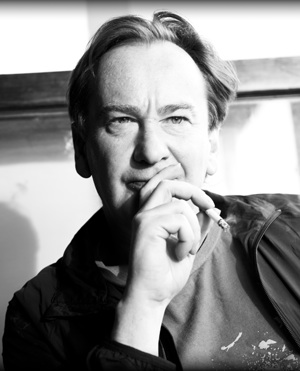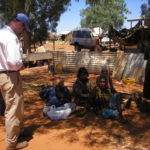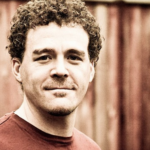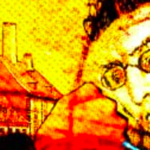Chris Taylor is a writer based in Bangkok and Southwest China. He wrote, co-wrote and updated Lonely Planet guides to Seoul, Tokyo, China, Tibet, Cambodia, Malaysia, and Indonesia, among other Asian destinations. He has also written a novel set in Asia, Harvest Season. He was coordinating author of the China, Japan and Southeast Asia: on a shoestring guides, and has contributed Asia-related material to other guidebook publishers. He has written for The Far Eastern Economic Review, Salon, Time, the South China Morning Post, The Age, and The Sydney Morning Herald, among many other newspapers and magazines.
How did you get started traveling?
I was traveling from the beginning. My family — Welsh/London/Italian — moved from London to Bristol, and then to Australia when I was 10. My father told me we’d hunt crocodiles. We never did. But I traveled Australia from the age of 17, and then, at 19, I went back to Britain. I worked odd jobs, played guitar and sang in the folk scene, and when I when I had enough money I flew to New Delhi. I had my 21st birthday in Calcutta, and the next day I flew to Bangkok, That was 1982. I didn’t believe I’d be a writer then — though it was what I secretly dreamed of becoming. But I was writing songs, and when I arrived in Bangkok I knew everything had changed. I would never go back permanently, and I’d have to find a way to work in Asia, and music was not going to be it.
How did you get started writing?
I’d been writing. It was a compulsion. It’s something I’d been doing since I could I write. But I didn’t consider it professionally an option. I actually thought I’d probably write obscurely — and occasionally be published. I always had a sense that what I had to say wouldn’t really resonate with mainstream audiences. Even though I continue to write for a living that remains true of my personal stuff.
What do you consider your first “break” as a writer?
Well, of course, being hired by Lonely Planet — this was in 1987, the early, fun days of Lonely Planet — and Tony Wheeler deciding that he and Robert Strauss and I would write a completely new Japan guidebook. More guidebooks followed, and I began submitting to inflight magazines, TIME, The Wall Street Journal, The Age and The Sydney Morning Herald and Salon, among many others, and everything I wrote was accepted.
As a traveler and fact/story gatherer, what is your biggest challenge on the road?
Prompting people to give me information. You need to be “cool”. You find yourself in many situations, but if you want to know what’s going on you need to make people like you — you enlist them, bring them onside — and they tell you the story. You’re a stranger, and the trick is to make yourself not a stranger. That could be locals or expats.
What is your biggest challenge in the research and writing process?
Yes, there’s a challenge — are you up for another arduous journey, for example? If you are, again it’s about getting the information, finding the right people to talk to. Once you have the information, and it’s time to write a story, you have to figure out where it begins and where it ends. For me, there’s always a point in the research, or the trip, in which I suddenly see where the story begins, and another in which I see the ending. It’s as if you’re imaginatively structuring your experience as it happens around you.
What is your biggest challenge from a business standpoint? Editors? Finances? Promotion?
All of the above. The business has changed. It became monetized and more advertorial — spas and golf, you name it. Good editors are few and far between today — often much younger than experienced writers. Finances? We’re generally paid the same we were 20 years ago (and people will ask you to contribute for free; many writers joke, “Exposure is the new word rate”) and the world is a more expensive place than it was 20 years ago. Promotion — well, we have to find a balance between self-promotion and productivity. Promotion — at least self-promotion — can be a game of diminishing rewards. There’s chemistry to success, and I continue to suspect it’s a kind of traction that adheres to you in mysterious and slow ways, unless you have fabulous contacts or luck.
Have you ever done other work to make ends meet?
Yes, I frequently write corporate copy and do odd things like invent names for companies. I’ve been involved with media start-ups. I write and photograph non-travel related material — I’ve helped launch a couple of newspapers, and still work with newspapers. I consider myself a media professional, but I think my best work is travel-related, perhaps fiction too, but it’s something I’m still working on. I’m slow.
What travel authors or books might you recommend and/or have influenced you?
Evelyn Waugh (the early travel writings), Peter Fleming (One’s Company and News from Tartary
are both classics), the early Paul Theroux, V.S. Naipaul, Bruce Chatwin (the short piece, “The Coup”, if nothing else), Pico Iyer (firstly, Video Night in Kathmandu
, and then the eloquence of his later reflections on why we travel). Some of Jan Morris’s work, and then Graham Greene, because often, when he’s writing fiction, he’s in the realm of the travel writer (The Quiet American
and The Heart of the Matter
, notably for me). Bill Bryson’s first two travel books (The Lost Continent
and Neither Here nor There
were excellent — pithy and funny). I think everybody in the business should read Ryszard Kapuściński (in particular Another Day of Life
) to understand how to write minimally, clean, and to the point. Read Redmond O’Hanlon’s Congo Journey
to learn how to lose control of a story and stay in control at the same time. The Rings of Saturn
by W.G. Sebald is unique on the subject of travel as a form of freedom to engage in deep discursive thought. And then of course, there’s Heart of Darkness
by Conrad — the ultimate modern metaphorical river journey. That’s an almost random sampling of a long list.
What advice and/or warnings would you give to someone who is considering going into travel writing?
Read as much as you can and have minimal expectations in terms of public reception — and revenue. Travel writing is something of dying genre, because everyone is a travel writer today — they’re blogging, posting on Instagram, etc. Write what you care about, and have a subsidiary income, but try to be as good as you can be when you do write. Tell a story. Be humble; don’t show off. It’s not about you — or at least only inadvertently. Write it and see what you’ve got. Edit it hard. Take the advice of others. Remember, it’s performance, and think about the audience. Be prepared to accept you’ve got it wrong. Change it. Sure, try the name publications, and if you’re rejected or ignored, blog and build a following.
What is the biggest reward of life as a travel writer?
The job gets easier. People want to give you information and help you. It aggregates. There’s magnetism to what you do. You shouldn’t underestimate it, but you also need to realize it takes years and years to get there — unless you’re a natural or you strike it lucky. I think in Harvest Season, a novel I wrote about drugs and the backpacker scene gone wrong in China, I said most of what I want to say about the travel “scene”, and there’s an explanation of my thinking about why I think the way I did here. I haven’t been “successful” by any meaningful definition of the term, other than I’m part of a small tribe of people who are able to travel and make a living while I’m doing so, even if I’m rarely actually writing about travel itself. All the same, I’ll continue to write about travel. And I’ll continue to travel. It’s been a condition of my life. I don’t see that changing.





